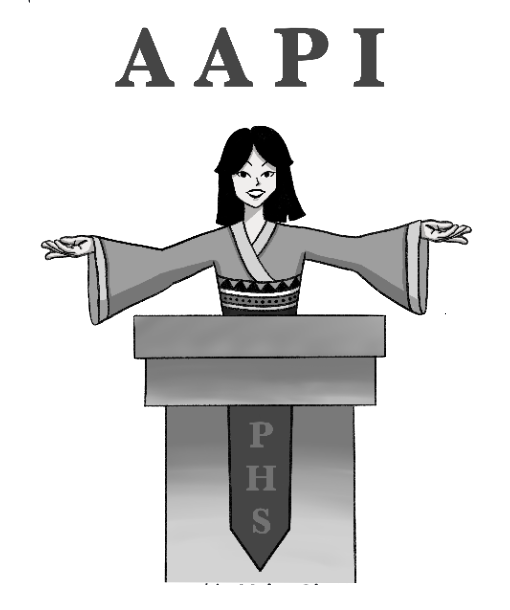We should have had an AAPI month assembly
June, 2024
Graphic: Maiya Qiu
Can you name one detail about Unit 731, the WWII research program with thousands of casualties? Probably not, but unfamiliarity with this tragedy isn’t your fault. Rather, the surprising lack of Asian American and Pacific Islander (AAPI) history in the outreach programs at PHS is to blame.
In order to understand why we don’t often learn about these topics, it is important to acknowledge the root cause: the marginalization of AAPI individuals in the United States. One source of this oppression is sinophobia, the fear or hatred of China, which spiked to an all-time high during the COVID-19 pandemic. The branding of the disease as primarily the fault of Chinese people caused a rise in racist name-calling and violent hate crimes against millions of Asian Americans, including those who weren’t of Chinese descent. One of the most horrific attacks was the 2021 Atlanta spa shooting, in which eight women, six of them Asian, were killed. This tragedy rattled AAPI communities across the country, serving as a stark reminder that they could be the target of a prejudiced hate crime. The Princeton community held a vigil honoring these victims and acknowledging anti-Asian racism, but initiatives like this do little to combat structural ignorance of AAPI people and history.
Historical programs at PHS often commemorate tragedies within western countries, such as the Holocaust, but overlook the suffering that people in Asian countries have faced throughout history. We have never once had an assembly or event about Unit 731, a Japanese research program during World War II that performed unsedated vivisections and purposely gave victims frostbite and the plague. It is estimated that Unit 731 killed up to half a million people, but United States authorities provided operation officials with legal immunity from these crimes in exchange for research information. Due to Japan’s destruction of evidence, the United States’ compliance, and its exclusion from our history awareness initiatives, few people in the United States learn of this brutal mass murder. To state another event that is overlooked by educational outreach programs at PHS is the Manila massacre, also known as the Rape of Manila, which took place during WWII. During the Manila massacre, the Imperial Japanese Army brutally murdered at least 100,000 Filipino civilians and raped hundreds of young girls and women. Though both of the above events undoubtedly caused significant trauma to the groups targeted, these cruel violations of human rights may become hidden away and slowly forgotten one day. Worsening this situation, PHS has failed to even acknowledge these horrific war crimes in Asian history during AAPI history month.
In defense of our school’s curriculum, there is only so much our teachers can show us in the vast expanse of history. However, that is exactly why we should be supplementing these parts of AAPI history through speaker events, much like the assembly for Jewish Heritage Month. When we invite knowledgable scholars to share information about Unit 731, they commemorate and pass down this important piece of world history down to future generations. After all, if we don’t know about the past, how can we stop ourselves from repeating it in the present?
Education, in the face of discrimination and political tensions, is crucial in the fight for AAPI representation. As an already marginalized group, AAPI communities need to see their history portrayed in outreach programs to both teach AAPI individuals about their ancestors and promote understanding within the broader student body. Through awareness, we acknowledge the struggles faced by cultural groups, work to prevent such atrocities from happening again, and celebrate the AAPI individuals within our community. It is time for PHS to take steps towards shedding light on the important topics ignored by our current outreach programs and fostering a greater culture of empathy and understanding of AAPI history in our school community.